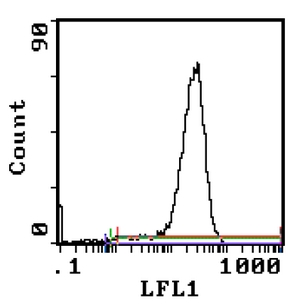MHC Class I H2 Kd/Dd Mouse Monoclonal Antibody [Clone ID: 34-1-2S]
CAT#: AM08081BT-S
MHC Class I H2 Kd/Dd mouse monoclonal antibody, clone 34-1-2S, Biotin
Conjugation: Unconjugated FITC PE
Specifications
| Product Data | |
| Clone Name | 34-1-2S |
| Applications | FC |
| Recommended Dilution | Flow Cytometry (See Protocols for more details). Results: Tissue Distribution by Flow Cytometry Analysis: Mouse Strain: BALB/c Cell Concentration : 1x10e6 cells per test Antibody Concentration Used: 0.5 µg/10e6 cells. Isotypic Control: Biotin Mouse IgG2a Cell Source: Percentage of cells stained above control Thymus: 82.5% Spleen: 95.7% Lymph Node: 100% |
| Reactivities | Mouse |
| Host | Mouse |
| Isotype | IgG2a |
| Clonality | Monoclonal |
| Immunogen | BDF splenocytes. Donor: C3H spleen. Fusion Partner: Sp2/0-Ag14. |
| Specificity | This Monoclonal Antibody reacts with both H-2Kd and H-2Dd products. The antibody also cross reacts with Kbsrpq. This K-D cross reaction indicates the presence of shared specificities between the two separate H-2 regions. |
| Formulation | PBS containing 0.02% Sodium Azide as preservative and EIA grade BSA as a stabilizing protein to bring total protein concentration to 4-5 mg/ml Label: Biotin State: Liquid purified Ig fraction |
| Concentration | lot specific |
| Purification | Protein G Chromatography |
| Conjugation | Biotin |
| Storage | Store the antibody undiluted at 2-8°C for one month or in (aliquots) at -20°C for longer. This product is photosensitive and should be protected from light. Avoid repeated freezing and thawing. |
| Stability | Shelf life: one year from despatch. |
| Background | The 'classical' MHC Class I molecules are histocompatibility antigens encoded by the H-2 gene complex and consist of heterodimers of highly polymorphic alpha chains noncovalently associated with the invariant beta 2-Microglobulin. (Ref.3,4) These antigens are expressed on most nucleated cells but expression varies on different cell types. MHC Class I molecules present endogenously synthesized peptides to CD8+ T lymphocytes, which are usually cytotoxic T cells. (Ref.5) MHC Class I antigens expressed on thymic epithelial cells regulate the positive and negative selection of CD8+ T cells during T cell ontogeny. (Ref.3,6) |
| Note | Strain Distribution by Flow Cytometry Analysis: Antibody Concentration: 0.2 µg/106 cells. Strains Tested (Figure 2): See Ref.9 for a more detailed strain distribution. Protocol: FLOW CYTOMETRY ANALYSIS: Method: 1. Prepare a cell suspension in media A. For cell preparations, deplete the red blood cell population with Lympholyte®-M; cell separation medium. 2. Wash 2 times. 3. Resuspend the cells to a concentration of 2x107 cells/ml in media A. Add 50 μl of this suspension to each tube (each tube will then contain 1 x 106 cells, representing 1 test). 4. To each tube, add 0.5–0.2 μg* of AM08081BT-S per 10e6 cells. 5. Vortex the tubes to ensure thorough mixing of antibody and cells. 6. Incubate the tubes for 30 minutes at 4°C. 7. Wash 2 times at 4°C. 8. Add 100 μl of secondary antibody (Streptavidin-FITC) at a 1:500 dilution. 9. Incubate tubes at 4°C for 30-60 minutes (It is recommended that tubes are protected from light since most fluorochromes are light sensitive). 10. Wash 2 times at 4°C. 11. Resuspend the cell pellet in 50 μl ice cold media B. 12. Transfer to suitable tubes for flow cytometric analysis containing 15 μl of propidium iodide at 0.5 mg/ml in PBS. This stains dead cells by intercalating in DNA. Media: A. Phosphate buffered saline (pH 7.2) + 5% normal serum of host species + sodium azide (100 μl of 2M sodium azide in 100 mls). B. Phosphate buffered saline (pH 7.2) + 0.5% Bovine serum albumin + sodium azide (100 μl of 2M sodium azide in 100 mls). |
| Reference Data | |
Documents
| Product Manuals |
| FAQs |
| SDS |
{0} Product Review(s)
Be the first one to submit a review






























































































































































































































































 Germany
Germany
 Japan
Japan
 United Kingdom
United Kingdom
 China
China




